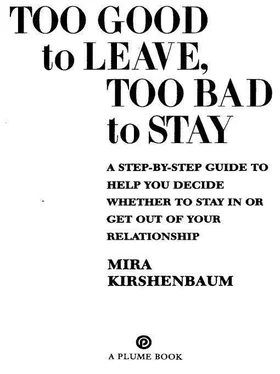Kirshenbaum, Mira - Too Good to Leave, Too Bad to Stay
Здесь есть возможность читать онлайн «Kirshenbaum, Mira - Too Good to Leave, Too Bad to Stay» весь текст электронной книги совершенно бесплатно (целиком полную версию без сокращений). В некоторых случаях можно слушать аудио, скачать через торрент в формате fb2 и присутствует краткое содержание. Жанр: Психология. Описание произведения, (предисловие) а так же отзывы посетителей доступны на портале библиотеки ЛибКат.
- Название:Too Good to Leave, Too Bad to Stay
- Автор:
- Жанр:
- Год:неизвестен
- ISBN:нет данных
- Рейтинг книги:3 / 5. Голосов: 1
-
Избранное:Добавить в избранное
- Отзывы:
-
Ваша оценка:
- 60
- 1
- 2
- 3
- 4
- 5
Too Good to Leave, Too Bad to Stay: краткое содержание, описание и аннотация
Предлагаем к чтению аннотацию, описание, краткое содержание или предисловие (зависит от того, что написал сам автор книги «Too Good to Leave, Too Bad to Stay»). Если вы не нашли необходимую информацию о книге — напишите в комментариях, мы постараемся отыскать её.
Too Good to Leave, Too Bad to Stay — читать онлайн бесплатно полную книгу (весь текст) целиком
Ниже представлен текст книги, разбитый по страницам. Система сохранения места последней прочитанной страницы, позволяет с удобством читать онлайн бесплатно книгу «Too Good to Leave, Too Bad to Stay», без необходимости каждый раз заново искать на чём Вы остановились. Поставьте закладку, и сможете в любой момент перейти на страницу, на которой закончили чтение.
Интервал:
Закладка:
The next question probes the one situation where more people have died of being enslaved to a blind love than any other. If the next question doesn’t make clear why we must put love into perspective, nothing will.
STEP #2: WHEN IT’S A MATTER OF LIFE AND DEATH
Another clear step may be possible right away toward discovering what’s best for you to do. Answer this:
Diagnostic question #2. Has there been more than one incident of physical violence in your relationship?
Notice I’m not asking you if there was only one incident; I’m asking if there was more than one incident. Of course, if there’s even one episode of physical violence that causes real injury or that makes you feel threatened with the real possibility of injury or death, there’s nothing to discuss and you need to leave immediately for the sake of your physical safety.
Other than that, I’m a firm believer that everyone is entitled to one mistake, and it’s hard to know what something means when it only happens once. I’ve seen a lot of situations where in the heat of an argument the man (it’s usually the man) commits some first act of physical aggression. It had never happened before, and either he’s horrified himself or she makes it clear that everything will be over if it ever happens again. And it never happens again. It’s when acts of physical aggression repeat themselves that you can point to a pattern.
Facing Reality
You might wonder if this question is really necessary. With all the attention paid to spousal abuse in the media, doesn’t everyone know that when there’s physical violence you just get out as fast as you can?
People know this in general. But when it comes to their actual lives they face two kinds of obstacles. One is that as a practical matter it’s often too difficult to get out, at least in the short run. People facing this obstacle fit the profile of the woman who’s afraid for her life and knows to leave but who stays because of children, money, not having a place to go, fear of provoking her husband to still worse abuse, and other considerations that put her in the category of people who know what’s best for them to do but haven’t yet figured out a way to do it.
But the majority of women and a few men who stay in spite of the threat of violence are stuck because of something far different than the image promulgated in the media. The obstacle isn’t that they can’t get out; instead, it’s that they can’t decide what to do. As amazing as it might sound, while they know they’re in a relationship that’s too bad to stay in, they also feel it’s too good to leave.
On the Inside
How can there be such ambivalence? From the outside we see someone physically abused to whom things should be very clear. But from their vantage point inside the relationship, what people report overwhelmingly is the struggle to weigh a mass of evidence both negative and positive that keeps them in a terrible state of relationship ambivalence.
Here’s how some people have described their lives as they actually experience them:
• “I admit I’m afraid of him sometimes, especially if things aren’t going well for him at work, but things can be so great, too, and we can be so happy together.”
• “Yeah, he slapped me some, and of course I hate that, and I know I deserve better, but most of the time I get a lot, too, because he’s also very sweet and apologetic.”
• “Forget about the times he hit me, which weren’t that bad, but he’s pulled his gun on me. It’s just that he’s a cop, and so in a way I really trust him. You might say I’m in denial, but he’s a very solid, reliable guy, and he makes me feel safer than most guys have.”
What millions of people like this in abusive relationships need is exactly what they themselves have been struggling so hard to find: a way to sort things out and decide what, in fact, is the best thing for them to do.
And here, too, experience and research speak with a clear voice. Slapping, punching, shoving, and other acts of physical violence, if they happen more than once, will not stop by themselves. They will escalate. The findings are very clear on this. Here’s the guideline:
GUIDELINE #2
Abuse that happens more than once means you must leave the relationship. Otherwise it will happen again and again, and it will get worse, and your self-esteem will fall, and your sense of being trapped will grow, and you’ll wish you’d started the process of getting out right now, however much you love the person and whatever the pluses in your relationship. The only exception to this is when the abusive partner is currently, actively, and motivatedly participating in a program designed to treat abusive partners and stays in this program for at least a year. Quick take: Physical abuse means love is dead.
Everyone who stays in a situation like this regrets it. Everyone who leaves feels better and better about it as time goes by.
Time for an Ultimatum
Here’s how to put this guideline into effect. If you’ve been abused more than once, this is a time to issue your partner an ultimatum:
Tell him he’s got to find a program for abusive partners within the next two weeks. He’s got to begin participating in it within the next four weeks. He’s got to maintain active consistent participation for a full year, going to at least one meeting a week. If he’s not willing to agree to this and keep to it, tell him that means to you that he’s not serious about eliminating all threats to your physical safety, and that means your relationship is over. If he leaves the program before a year is up or if he ever hurts you or threatens to hurt you again, that means your relationship is over.
If you’re afraid to even issue this ultimatum, that by itself means that your relationship is over and you must do whatever’s necessary to contact women’s shelters or spousal abuse resource centers to figure out how to leave your relationship both quickly and safely.
Simple Truths
If you’re in a physically abusive situation, part of you probably feels it’s more complicated than this. You love your partner and wonder how you can walk out on love like this. Your partner has most likely said how much he loves you during the period after he’s abused you, when he’s very sorry, and part of you may believe that his love is real even while he’s abusing you. You’re aware of his good qualities and of things you do that you feel provoke him. Perhaps the whole world thinks of him as a great guy, and so part of you feels crazy for thinking there’s something terribly wrong with him.
And you feel that a good person like you couldn’t love a bad person, so you think sometimes that he couldn’t possibly be the monster he seems like, which means (you hope) that any day now he could wake up and your nightmare will be over. And you’re sure your love can help you find a way to help him wake up.
I understand what your love means to you (and some of the questions coming up will help clarify how to deal with love that can make it so hard to figure out what to do). And I understand that most things in life really are more complicated than they seem on the surface. But if you answered yes to question #2, then it’s certain you’ll say you made the right choice if you decide to leave. It may feel more complicated than this, but in a situation where there’s been repeated physical abuse, it isn’t.
PERSPECTIVES: REGAINING YOUR SELF-TRUST
This is not only a book about figuring out whether to stay in your relationship or leave it. It’s also about undoing some of the damage that occurs from being stuck in relationship ambivalence. And one of the most important kinds of damage is loss of your self-trust.
Читать дальшеИнтервал:
Закладка:
Похожие книги на «Too Good to Leave, Too Bad to Stay»
Представляем Вашему вниманию похожие книги на «Too Good to Leave, Too Bad to Stay» списком для выбора. Мы отобрали схожую по названию и смыслу литературу в надежде предоставить читателям больше вариантов отыскать новые, интересные, ещё непрочитанные произведения.
Обсуждение, отзывы о книге «Too Good to Leave, Too Bad to Stay» и просто собственные мнения читателей. Оставьте ваши комментарии, напишите, что Вы думаете о произведении, его смысле или главных героях. Укажите что конкретно понравилось, а что нет, и почему Вы так считаете.












